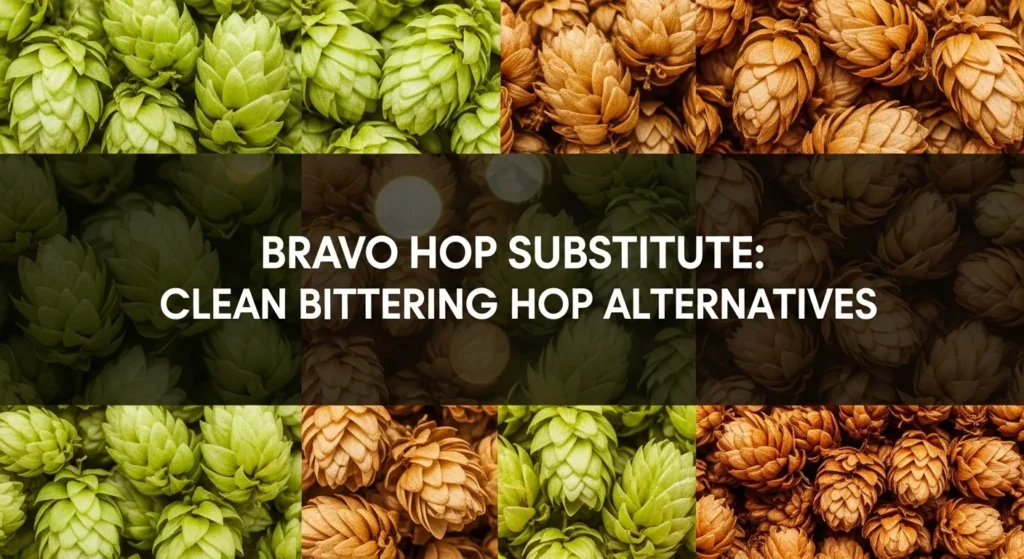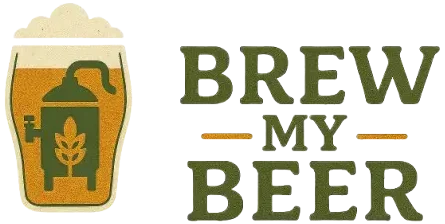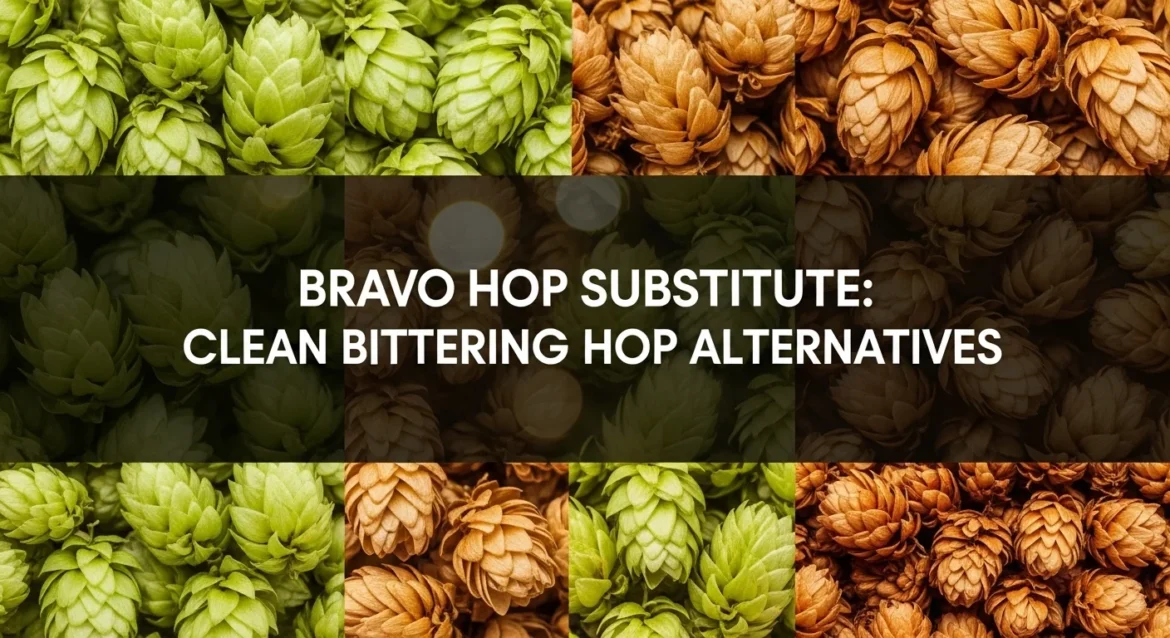Find the best Bravo hop substitutes with clean bittering power. Discover American alternatives for IPAs, pale ales, and high-alpha brewing.

Planning that perfectly balanced IPA with Bravo hops only to discover they’re sold out at your supplier? I’ve faced that exact frustration countless times in my brewing career. This versatile American high-alpha hop has developed a dedicated following for its distinctive clean bittering with subtle fruity character, creating demand that occasionally exceeds availability at local suppliers. The good news? Several American-grown hop varieties can replicate that distinctive combination of high alpha acids and remarkably clean bitterness that makes Bravo essential for balanced hop-forward beers.
Finding the right Bravo hop substitute requires understanding what makes this hop special beyond just high alpha acids. It’s about capturing that distinctive combination of exceptionally clean bittering, subtle fruity-floral character, and high alpha efficiency that creates firm bitterness without harsh edges. After brewing with Bravo and testing various alternatives over the past eight years, I’ve identified which substitutes actually deliver on their clean bittering promises and which fall disappointingly short when smooth, efficient bitterness matters.
This guide explores proven alternatives that maintain your beer’s intended balance while offering different dimensions. Whether you’re brewing an American IPA, pale ale, or imperial stout, you’ll find practical solutions that work.
Understanding Bravo’s Clean Bittering Power
Bravo emerged in 2006 from Hopsteiner breeding as dwarf male selection. This high-alpha hop delivers fruity, earthy, floral, mild, and clean characteristics with high alpha acids of 14-17%. What distinguishes Bravo from other high-alpha hops is its remarkably clean bittering quality with subtle fruity-floral character that creates smooth, firm bitterness rather than harsh, aggressive edges typical of some super high-alpha varieties.
The hop’s development represented American breeding’s emphasis on clean, efficient bittering hops suitable for diverse styles. Bravo’s high alpha acids provide excellent bittering efficiency while its refined fruity-floral character creates gentle complexity when used in late additions where homebrewing equipment can showcase delicate aromatics.
When I first brewed with Bravo in an American pale ale six years ago, the clean powerful bittering combined with subtle fruity backing created exactly the balanced hop character I sought. That smooth, efficient power is Bravo’s magic – strong enough for high IBUs yet refined enough to avoid harshness.
Top Bravo Hop Substitute Options
Columbus: The CTZ Powerhouse
Columbus stands as the most logical Bravo substitute for brewers seeking high-alpha American character. This legendary variety delivers pungent, earthy, spicy, citrus, and herbal characteristics with high alpha acids of 14-18% that match Bravo’s range closely.
Released in 1994, Columbus (also called Tomahawk and Zeus – collectively CTZ) represents classic American high-alpha breeding. The hop shares Bravo’s emphasis on powerful bittering while offering more pronounced earthy-spicy complexity instead of pure clean character, creating bolder alternatives when distinctive hop flavor matters.
I’ve successfully substituted Columbus for Bravo in IPAs and pale ales by using approximately equal weights thanks to similar alpha acids. The beer’s character maintains high-alpha bittering power while shifting toward earthy-spicy rather than clean-fruity, creating classic American hop-forward profiles. Use Columbus when you want proven high-alpha performance with wide availability from the Brewers Association standards.
Magnum: Ultimate Clean Bittering
Magnum brings clean, mild, slightly floral, and neutral characteristics with high alpha acids of 12-17%. This German-American variety provides exceptionally clean bittering that matches Bravo’s smooth character while offering even more neutral flavor profiles.
Developed in Germany then cultivated in America, Magnum shares emphasis on clean, efficient bittering. While offering similar alpha acids and perhaps even cleaner bittering, Magnum’s extremely neutral character creates alternatives when pure bittering efficiency without any flavor contribution matters most.
When substituting Magnum for Bravo, use approximately equal weights thanks to similar alpha acids. The hop’s remarkably clean character works perfectly for bittering additions where neutral bitterness supports rather than dominates aromatic hop additions. Magnum excels when brewing craft beer with clean foundations.
Nugget: Classic American High-Alpha
Nugget delivers herbal, spicy, resinous, and heavy characteristics with high alpha acids of 12-14%. This American workhorse provides powerful bittering that can approximate Bravo’s efficiency while offering different flavor profiles.
Released by USDA breeding in 1970, Nugget represents early American high-alpha development. While lacking Bravo’s clean character, Nugget’s reliable high-alpha bittering creates accessible alternatives when proven performance matters more than refined smoothness.
Use approximately 15-25% more Nugget by weight when substituting for Bravo to compensate for moderately lower alpha acids. The beer’s character shifts toward herbal-resinous rather than clean-fruity, creating traditional high-alpha bittering suitable for robust styles.
Warrior: Clean High-Alpha Alternative
Warrior offers clean, mild, slightly citrus, and neutral characteristics with high alpha acids of 15-17%. This American variety provides clean bittering similar to Bravo’s smooth character with comparable alpha acid efficiency.
Released from Yakima Chief breeding, Warrior shares emphasis on clean, efficient bittering. The hop’s specific clean-mild profile echoes Bravo’s smooth bittering nature while offering slightly higher alpha acids, creating direct alternatives when clean character matters.
When substituting Warrior for Bravo, use approximately equal weights thanks to similar alpha acids. The beer maintains clean high-alpha bittering with neutral character that works excellently for firm bitterness without harsh edges.
Galena: American Clean Bittering
Galena brings earthy, citrus, mild fruit, and clean characteristics with high alpha acids of 12-14%. This American variety provides efficient clean bittering with subtle earthy notes.
Released by USDA breeding in 1978, Galena shares high-alpha American breeding goals. While offering moderately lower alpha acids than Bravo, Galena’s clean bittering with subtle earthy character creates neutral alternatives when bittering efficiency with minimal flavor matters.
Use approximately 15-25% more Galena by weight when substituting for Bravo to compensate for lower alpha acids. The hop’s clean character works well for bittering additions where smooth bitterness matters.
Summit: Bold Citrus High-Alpha
Summit delivers orange, tangerine, grapefruit, onion, and garlic characteristics with very high alpha acids of 17-19%. This American variety provides massive bittering with polarizing onion-garlic notes that differ significantly from Bravo’s clean profile.
Released by Yakima Chief in 2003, Summit shares extreme alpha acid goals. While offering higher alpha acids, Summit’s distinctive onion-garlic character creates controversial alternatives that work in some styles but overwhelm others. Test Summit cautiously before committing.
When substituting Summit for Bravo, use approximately 85-95% of original amounts thanks to higher alpha acids. The beer’s character shifts dramatically toward citrus-onion rather than clean-fruity, creating polarizing profiles.
Blending Strategies for Complete Substitution
The 70/30 Clean Bittering Blend
My most successful Bravo replacement combines 70% Magnum with 30% Columbus. This blend captures Magnum’s exceptionally clean bittering while Columbus adds subtle earthy complexity approximating Bravo’s clean-fruity profile. The combination creates more complete character than either hop alone.
Calculate your total hop bill first, then split according to this ratio for bittering additions. Use approximately equal total quantities to original Bravo amounts thanks to similar combined alpha acids while achieving clean American bittering character.
The High-Alpha Approach
For maximum alpha acid efficiency, use Warrior alone for bittering then add aromatic hops for late additions. This strategy maximizes bittering efficiency while preserving expensive aromatic hops for flavor and aroma contributions.
Use approximately equal Warrior quantities to original Bravo amounts for bittering, then add preferred aromatic varieties for complete profiles.
Single-Hop Simplicity
Sometimes simplicity wins. For straightforward beers where clean high-alpha efficiency matters most, Magnum alone provides the most neutral bittering at equivalent weights. The hop’s legendary clean character makes it ideal when pure bittering defines the application.
For beers demanding high-alpha with subtle character, Warrior by itself works at similar quantities. The hop’s clean nature creates compelling direct alternatives.
Beer Style Considerations
American IPAs and Pale Ales
These hop-forward styles showcase high-alpha hops well. Columbus or Warrior work exceptionally well as Bravo substitutes, providing powerful bittering that supports generous late hop additions.
Use generous hopping rates (1.5-3 oz per gallon total across all additions) with substantial bittering (50-70 IBUs) from high-alpha additions. American IPA brewing demonstrates that efficient bittering creates foundations for aromatic complexity.
Imperial Stouts and Barleywines
Massive styles benefit from Magnum or Nugget substitutions that provide powerful clean bittering balancing intense malt sweetness without excessive hop flavor.
Use moderate-high hopping rates (1-2 oz per gallon total) focusing on substantial bittering (50-80 IBUs) that creates balance. High-alpha efficiency creates necessary bitterness from reasonable hop quantities.
Lagers and Pilsners
Clean lager styles showcase Magnum where exceptionally neutral bittering supports delicate malt character and subtle hop aromatics.
Keep total hop rates moderate (0.75-1.5 oz per gallon) with clean bittering (25-40 IBUs) and restrained late additions. Clean high-alpha hops create crisp bitterness without interfering with lager elegance.
Here is the comparison chart:
Bravo Hop Substitute Comparison Chart – Alpha Acids, Flavors, and Beer Style Compatibility
Timing Your Hop Additions for Clean Bitterness
Dominant Bittering (60 Minutes)
Bravo’s high alpha acids (14-17%) create efficient bittering that defines balanced hop-forward beers. Use Bravo substitutes primarily at 60 minutes to establish firm bitterness efficiently.
I typically use 0.75-1.5 oz per gallon at 60 minutes with Bravo substitutes to establish baseline bitterness around 40-70 IBUs appropriate for IPAs and hop-forward pale ales. The high-alpha efficiency minimizes hop material while achieving substantial bitterness.
Limited Flavor Additions
Bravo serves primarily as bittering hop rather than flavor variety. When using flavor additions, employ restrained quantities (0.25-0.5 oz per gallon at 15 minutes) to add subtle character without excessive hop flavor.
Most brewers reserve flavor and aroma additions for more characterful varieties, using clean high-alpha hops exclusively for bittering efficiency.
Minimal Late Additions
High-alpha bittering hops rarely appear in late additions due to bittering focus. When using late additions with Bravo substitutes, employ very restrained quantities (0.1-0.25 oz per gallon at flameout) to add minimal character.
Modern brewing demonstrates clear hop role separation – bittering hops for bitterness, aromatic hops for flavor and aroma.
Strategic Dry Hopping
Bravo occasionally appears in dry hopping for subtle fruity character. When dry hopping with Bravo substitutes, use moderate quantities (0.5-1 oz per gallon) for 3-4 days alongside more aromatic varieties.
Most dry hopping emphasizes aromatic hop varieties rather than high-alpha bittering hops.
Adjusting for Alpha Acids and Character
Understanding Bravo’s High-Alpha Profile
Bravo’s high alpha acids (14-17%) create substantial bittering efficiency. Most substitutes have similar or slightly different alpha acids requiring minimal to moderate quantity adjustments.
Use this formula: (Bravo AA% ÷ Substitute AA%) × Original Amount = Substitute Amount. For example: (15.5% ÷ 13%) × 1 oz = 1.19 oz of Nugget needed to replace 1 oz of Bravo for equivalent bitterness.
Oil Content and Character
Bravo’s moderate oil content creates subtle fruity-floral character when used in late additions. Substitutes with different oil compositions emphasize different flavors – Magnum provides cleaner neutral, Columbus adds earthy-citrus, and Warrior contributes mild citrus complexity.
Water Chemistry for Balanced Expression
Moderate Sulfate for Hop Character
Balanced hop-forward brewing utilizes moderate sulfate profiles (150-250 ppm) that accentuate hop character without creating harsh edges.
For Bravo substitutes in IPAs and pale ales, target sulfate-to-chloride ratios of 1.5:1 to 2:1. This mineral balance supports hop character while maintaining smooth drinkability.
Clean Water for Lagers
For lagers and pilsners, soft water with low minerals allows clean bittering to express without interference. Target sulfate and chloride both below 100 ppm for maximum refinement.
Yeast Strain Synergies
Clean American Ale Yeast
For hop-forward styles, exceptionally clean American yeasts (WLP001/US-05, Wyeast 1056) provide neutral canvases where hop character dominates.
Ferment at moderate temperatures (66-68°F) to minimize yeast-derived flavors. The clean profile lets high-alpha bittering and aromatic hops express fully.
Lager Yeast Excellence
For lagers, clean lager yeasts (WLP830/W-34/70) create crisp foundations where clean bittering shines beautifully.
Ferment at proper lager temperatures (48-54°F) to create clean profiles. Extended lagering allows clean bitterness to integrate smoothly.
Sourcing and Availability
Bravo Accessibility
Bravo enjoys good availability through American hop suppliers. When available, expect moderate pricing ($12-16 per pound) comparable to other American high-alpha varieties.
The hop’s clean character maintains steady demand among brewers seeking smooth, efficient bittering.
Substitute Availability
Most Bravo substitutes enjoy excellent availability. Columbus, Magnum, Nugget, Warrior, and Galena stock reliably year-round through major suppliers at competitive prices ($10-16 per pound). Summit faces moderate availability through specialty suppliers.
Storage Best Practices
Store all hops in oxygen-barrier bags in your freezer at 0°F or below. High-alpha bittering hops maintain bittering power longer than delicate aroma varieties but should be used within 9-12 months for peak quality.
Common Substitution Mistakes
Wrong Alpha Acid Calculations
Failing to adjust quantities when using different alpha acid substitutes creates incorrect bitterness. Always calculate substitution amounts based on alpha acid ratios.
Excessive Late Additions
Using high-alpha hops excessively in late additions wastes bittering efficiency on aromatics. Reserve expensive high-alpha hops for bittering where they excel.
Ignoring Character Differences
Assuming all high-alpha hops taste identical ignores significant character differences. Columbus provides earthy-spicy, Magnum offers clean-neutral, and Summit adds polarizing onion-garlic.
Frequently Asked Questions
What is the closest substitute for Bravo hops?
Warrior provides closest overall match with similar high alpha acids (15-17%) and clean mild character. Magnum offers even cleaner bittering with similar alpha acids (12-17%) ideal for neutral applications. Columbus provides convenient high-alpha alternative (14-18%) with more pronounced earthy-spicy character when distinctive flavor matters.
Can I use just one hop instead of Bravo?
Yes, single-hop substitutions work excellently for high-alpha applications. Magnum excels in pure bittering applications needing exceptionally clean neutral character. Warrior suits balanced styles needing clean high-alpha. Columbus works in hop-forward beers tolerating earthy-spicy character. Choose based on desired cleanliness and character.
How much substitute hop should I use compared to Bravo?
For Magnum (14.5% AA) replacing Bravo (15.5% AA), use approximately 1.07× the amount for equivalent bitterness. For Columbus (16% AA), use about 0.97× original amounts. For Nugget (13% AA), use roughly 1.19× Bravo quantities. Adjust based on specific alpha acid percentages using the formula provided.
Do these substitutes work in all beer styles?
Bravo substitutes adapt well across hop-forward and high-IBU styles. Magnum and Warrior suit clean bittering applications universally. Columbus works in American IPAs and pale ales. Nugget and Galena excel in robust porters and stouts. Avoid using exclusively for delicate styles where minimal bitterness matters.
When should I add these hops during brewing?
Use generous bittering additions (0.75-1.5 oz per gallon at 60 minutes) establishing firm bitterness (40-70 IBUs) appropriate for hop-forward styles. Limited flavor additions (0.25-0.5 oz per gallon at 15 minutes) add subtle character. Minimal late additions maximize bittering efficiency by reserving aromatic hops for flavor and aroma.
Will my beer taste exactly the same with substitutes?
No substitute perfectly replicates Bravo’s exact clean-fruity combination with high alpha efficiency, but well-chosen alternatives create equally smooth bittering. Magnum emphasizes cleaner neutral, Warrior provides similar clean-mild, and Columbus adds earthy-spicy complexity maintaining high-alpha efficiency.
Where can I buy these substitute hops?
Major online suppliers like Yakima Valley Hops, Northern Brewer, and BSG Craft Brewing stock Columbus, Magnum, Nugget, Warrior, and Galena year-round with excellent availability. All substitutes maintain competitive pricing ($10-16 per pound) with reliable domestic production.
How should I store substitute hops?
Store all hops in oxygen-barrier packaging (vacuum-sealed mylar bags) in freezer at 0°F or below. High-alpha bittering hops maintain alpha acid potency for 9-12 months frozen with gradual degradation. Use freshest hops for accurate IBU calculations.
Making Your Final Choice
Selecting the perfect Bravo hop substitute depends on your beer style, desired cleanliness, and hop availability. Magnum offers cleanest bittering for brewers seeking exceptionally neutral character in lagers, pilsners, and balanced pale ales where smooth foundations matter.
Warrior provides closest direct alternative matching Bravo’s clean high-alpha character. Its refined nature creates compelling substitutions when Bravo proves unavailable while maintaining smooth bittering quality.
Columbus delivers proven American high-alpha for brewers seeking distinctive earthy-spicy character in hop-forward IPAs and pale ales where bold American hop profiles matter.
Remember that exceptional beer comes from understanding hop roles and using appropriate varieties strategically. High-alpha hop substitutions focus on maximizing bittering efficiency while preserving character for aromatic contributions.
Don’t be afraid to use clean Magnum for pure bittering, embrace Warrior as direct Bravo alternative, or blend high-alpha varieties for complete profiles. The craft brewing community continues proving that thoughtful substitution creates balanced results.
Whether you’re crafting a balanced American pale ale, hop-forward IPA, or clean lager, these Bravo substitutes will help you create exceptional beer that captures clean high-alpha bittering. Trust proper calculations, brew with strategic hopping, and embrace the smooth efficiency that makes modern high-alpha brewing so effective and rewarding.
About the Author
John Brewster is a passionate homebrewer with over a decade of experience experimenting with different beer styles and hop varieties, with particular expertise in American high-alpha hops and balanced pale ale brewing. He has brewed over 350 original recipes featuring hop-forward styles and maintains relationships with specialty hop suppliers worldwide. John holds brewing certifications and regularly contributes articles about hop selection and bittering techniques to homebrewing forums and clubs. When not brewing, John enjoys exploring balanced hop-forward beers and teaching workshops focused on efficient brewing practices. Connect with him on Instagram for weekly high-alpha hop insights and bittering tips.

